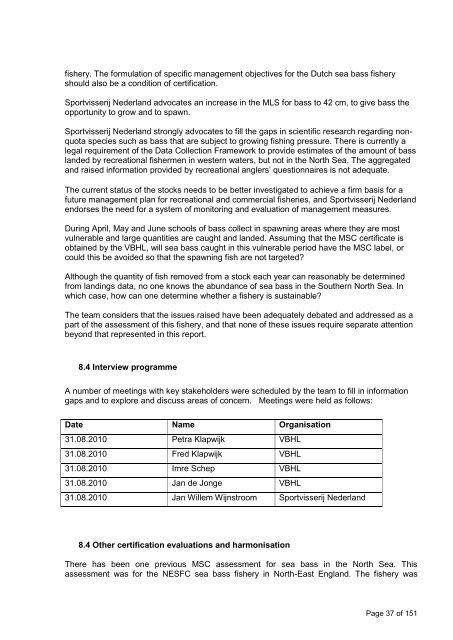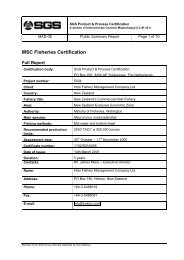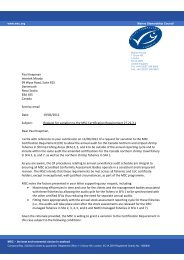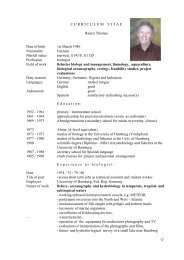SGS Product & Process Certification - Marine Stewardship Council
SGS Product & Process Certification - Marine Stewardship Council
SGS Product & Process Certification - Marine Stewardship Council
You also want an ePaper? Increase the reach of your titles
YUMPU automatically turns print PDFs into web optimized ePapers that Google loves.
fishery. The formulation of specific management objectives for the Dutch sea bass fishery<br />
should also be a condition of certification.<br />
Sportvisserij Nederland advocates an increase in the MLS for bass to 42 cm, to give bass the<br />
opportunity to grow and to spawn.<br />
Sportvisserij Nederland strongly advocates to fill the gaps in scientific research regarding nonquota<br />
species such as bass that are subject to growing fishing pressure. There is currently a<br />
legal requirement of the Data Collection Framework to provide estimates of the amount of bass<br />
landed by recreational fishermen in western waters, but not in the North Sea. The aggregated<br />
and raised information provided by recreational anglers‘ questionnaires is not adequate.<br />
The current status of the stocks needs to be better investigated to achieve a firm basis for a<br />
future management plan for recreational and commercial fisheries, and Sportvisserij Nederland<br />
endorses the need for a system of monitoring and evaluation of management measures.<br />
During April, May and June schools of bass collect in spawning areas where they are most<br />
vulnerable and large quantities are caught and landed. Assuming that the MSC certificate is<br />
obtained by the VBHL, will sea bass caught in this vulnerable period have the MSC label, or<br />
could this be avoided so that the spawning fish are not targeted?<br />
Although the quantity of fish removed from a stock each year can reasonably be determined<br />
from landings data, no one knows the abundance of sea bass in the Southern North Sea. In<br />
which case, how can one determine whether a fishery is sustainable?<br />
The team considers that the issues raised have been adequately debated and addressed as a<br />
part of the assessment of this fishery, and that none of these issues require separate attention<br />
beyond that represented in this report.<br />
8.4 Interview programme<br />
A number of meetings with key stakeholders were scheduled by the team to fill in information<br />
gaps and to explore and discuss areas of concern. Meetings were held as follows:<br />
Date Name Organisation<br />
31.08.2010 Petra Klapwijk VBHL<br />
31.08.2010 Fred Klapwijk VBHL<br />
31.08.2010 Imre Schep VBHL<br />
31.08.2010 Jan de Jonge VBHL<br />
31.08.2010 Jan Willem Wijnstroom Sportvisserij Nederland<br />
8.4 Other certification evaluations and harmonisation<br />
There has been one previous MSC assessment for sea bass in the North Sea. This<br />
assessment was for the NESFC sea bass fishery in North-East England. The fishery was<br />
Page 37 of 151





